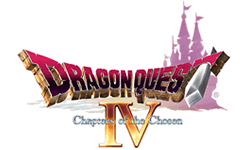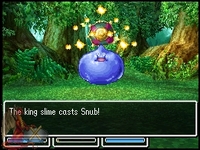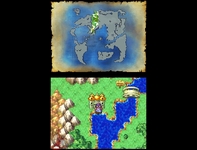|
|

|
PLATFORM
|
DS
|
BATTLE SYSTEM
|

|
INTERACTION
|

|
ORIGINALITY
|

|
STORY
|

|
MUSIC & SOUND
|

|
VISUALS
|

|
CHALLENGE
|
Moderate
|
COMPLETION TIME
|
20-40 Hours
|
|
OVERALL

|
+ Unique, investing structure
+ Quick & uncomplicated combat
+ Enjoyable soundtrack
- No party talk
- Same ol' Dragon Quest interface
- Grind time is here
|
Click here for scoring definitions
|
|
|
Dragon Quest games usually don't come to mind when interesting RPG stories are mentioned, but some installments in the series did a lot of nifty things that were quite progressive when first released. Dragon Warrior IV certainly counts in that regard, as its character introduction method was unheard of on the NES when the game saw its initial release. The title is hardly a bastion of innovative game design in its DS remake, but Dragon Quest IV: Chapters of the Chosen is still unusually structured, and anyone with an inkling of interest in Dragon Quest will find a worthwhile adventure.
Dragon Quest IV takes its time to introduce the main story, instead going through four chapters that are short by RPG standards to familiarize the player with the supporting cast. Ragnar's search for missing children, Alena's desire to explore the world with her two adjutants, Torneko's quest to better his family's circumstances by opening his own store, and Meena and Maya's mission to catch their father's killer all get a share of playtime before the hero takes center stage. By giving each one a piece of the narrative to themselves, these characters become much more memorable. The plot of the game once the central hero takes the stage is more conventional, but still well told by the standards of what was originally an NES title, and holds up today.
Considering the high standard of the translation, which endeavors to give every region of the game world a distinct flavor through text approximations of real world accents, the absence of the party chat feature from the Japanese game is felt quite strongly. Dragon Quest V and VI on DS would incorporate this feature in their localizations, neutralizing the argument made at the time that the necessary memory was unavailable. Dragon Quest IV continues to have a more involving narrative than the reputation of the series would suggest, but the key bit which would have kept interest going during some later portions was taken away from those outside Japan.
Dragon Quest games feature more time in combat than storytelling, and Chapters of the Chosen is no exception. Random turn-based battles proliferate through the game, and their essentials are hardly changed from the original version on the NES. Enemies in groups cannot be individually targeted, and the turn order of actions sometimes varies wildly. Fights are fortunately seldom challenging enough to make precision control of actions mandatory, and the speed with which actions are carried out allows most battles to proceed quickly and efficiently. Battles may not be innovative in Dragon Quest IV, with the fascinating exception of being able to transfer party members from active duty to the reserve in many areas, but they succeed in being briskly effective.
 But - but I wanted to be friends! That's not nice!
But - but I wanted to be friends! That's not nice!
|
|
In a definite improvement over the original NES game, all characters are under player control throughout the title except a few short term guests who are governed by AI. The option to change all characters except the hero to AI control exists, but manually ordering them feels much more natural. Victory is much easier to ensure when three of the four characters in a battle lineup are prevented from doing stupid things at the whim of the computer.
When it comes to the interface, Dragon Quest IV is a definite improvement over its NES incarnation while demonstrating how steeped in tradition the series remains. The effects of new equipment are conveniently displayed prior to purchase, which considering the game's original implementation was not a given. Saving can still only be accomplished by visiting the priests of townships though, so carelessly turning off the game is very painful. All of the menus do their job, just with a few more button presses than would be preferable, while some of the items that can be used in combat never say exactly what their usage will accomplish, and inventory management is more time-consuming than it should be. The interface isn't terrible by the standards of DS RPGs, but it does show how the series is comfortable retaining extra button presses not seen in many other titles nowadays.
 Monsters just love giving their treasure to Torneko. Watch him get goodies!
Monsters just love giving their treasure to Torneko. Watch him get goodies!
|
|
Finishing Dragon Quest IV is not a difficult task so long as one is willing to grind. There is no substitute for pounding random enemies into the dirt repeatedly in order to improve statistics, and doing this will take up a considerable chunk of the twenty-five to thirty hours necessary for completion. Like other Dragon Quest games, defeat simply boots the player back to the last church minus half the current money instead of seeing a Game Over screen, so attempts to push forward will not be punished grievously.
It may have originated on the NES, but this rendition of the game looks far more like the PlayStation remake that never saw release outside Japan. The world map is far more colorful than Nintendo's first console could ever have achieved, and the animations in battle are actually quite fluid and impressive. They may not push the DS hardware to new levels, but enemy attacks and spell animations display eye-pleasing 2D prowess, with the presence of Akira Toriyama's character portraits helping give faces to a cast that otherwise never shows itself in battle.
Koichi Sugiyama's score is full of varied and interesting music, with the ability to change the world map theme by putting a different character at the party's head being a welcome highlight. In another pleasant happening the sound quality is quite high, displaying how appealing the compositions can be when care is taken to ensure clarity. Not every track is a winner, but enough are to make keeping the audio on a good idea.
Judging Dragon Quest IV strictly by the standards of DS RPGs is difficult to do, considering its original creation back before the Super Nintendo existed. Most of the game has been updated to fit in pretty well with the other games on the handheld, and its story was quite progressive at the time of the original release. Even today the game is unique in its method of storytelling — but it's still a Dragon Quest title, and Square Enix did it no favors by removing party chat upon localization. Those curious about the series would find this a good entry point, those who spurn Dragon Quest will find nothing to change their minds, and series diehards don't need to be told what it does well.
Review Archives
|









